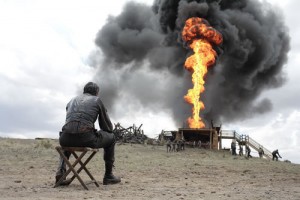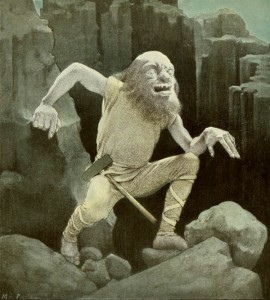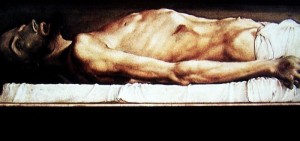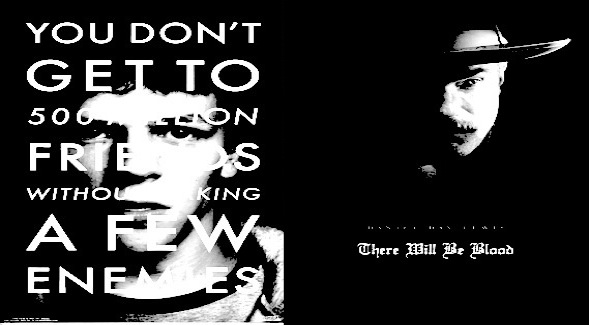[In advance of this weekend’s Oscars ceremony, enjoy this post on a 2011 Oscar favorite and a 2008 Oscar winner by Jared Bauer! – Ed.]
How curious it is that the posters for both David Fincher’s procedural about the conception of a social phenomenon and Paul Thomas Anderson’s drama about an oil baron show little to no indications of their respective subjects- oil or the internet? Instead, they sport unflattering mug shots, both with peculiarly indistinct expressions.
Not only are the themes of capitalism, deception, and ambition present in both films, but they both depict the emergence of important technological milestones. Plainview’s conquest of oil in the early 1900s marks a revolution in transportation, industry, technology and anticipates the world’s inevitable reliance on it. Likewise, facebook represents a revolution in communication- both in the way we develop and define human interactions. Although nobody could foresee the impact that these inventions would have on the world, some writers have been predicting the ramifications of modernity as early as the early 19th century. In the face of the first industrial revolution, fierce westernization, and free market capitalism, storytellers such as Fyodor Dostoevsky and Richard Wagner prophesized the effects that the new world would have on man as an individual.
And thus, we are presented with two theatrical posters that emphasize the individual. Not the setting or the plot- the individual. Do The Social Network and There Will Be Blood fulfill their dismal prophecies of modernity? Do these films mark the arrival of an era of impotence, isolation, loneliness, greed, and godlessness?
For every one strives to keep his individuality as apart as possible, wishes to secure the greatest possible fullness of life for himself; but meantime all his efforts result not in attaining fullness of life but self-destruction, for instead of self-realization he ends by arriving at complete solitude.
-Fyodor Dostoevsky, The Brothers Karamazov
I’m CEO, Bitch
Consider that both characters achieve stupendous prosperity in their respective field. However, the quest for money or personal achievement is not an end in itself. There is some outside influence that provokes this lust for riches.
Sean Parker: You know why I started Napster? The girl I loved in high school was with the co-captain of varsity lacrosse team and I wanted to take her from him. So I decided to come up with the next big thing. They’re scared of me pal and they’re gonna be scared of you. What the VC’s wanted to say was “Good idea, kid. Grown ups will take it from here”. But not this time. This is our time. This time you’re gonna…you’re gonna hand ’em a business card that says “I’m CEO Bitch”. That’s what I want for you.
Sorkin implements an angel/devil dynamic in the conception of the characters of Eduardo Saverin and Sean Parker. Whereas Eduardo’s appeal to Mark is one based on friendship, Sean Parker appeals to Mark through empathy- an empathy of being rejected and humiliated by those who hold power, whether it be beautiful women, venture capitalists, or final clubs. With Eduardo being recently “punched” by the Phoenix, the feeling of exclusion is an important emotional quality that Mark and Eduardo can no longer share. So it’s no wonder that Sean’s influence ultimately wins Mark over, for the pain of being excluded fuels Mark’s ambition to excel.
But Mark’s aspiration to succeed is derived not from the desire to embrace new social groups, but rather, from the desire to distance himself from others. The purpose of community in the era of Facebook is one that, ironically, distinguishes and accentuates one’s individualism rather than truly establishing an identity built on connection. Mark Zuckerberg is not seeking social solidarity. He is seeking to build himself up humiliate those that denied him acceptance.
Plainview: Well, if it’s in me, it’s in you. There are times when I look at people and I see nothing worth liking. I want to earn enough money that I can get away from everyone. I see the worst in people. I don’t need to look past seeing them to get all I need. I’ve built my hatreds up over the years, little by little. I can’t keep doing this on my own with these… people.
To say that Daniel Plainview’s plight is mere misanthropy would oversimplify it. In fact, for a misanthrope, Plainview participates in a job that involves him constantly delegating, bargaining, and collaborating with other people. Surely one doesn’t need much money to be a hermit, so why does Daniel insist on a life of luxurious isolation? Because in the modern era (especially in capitalist America), the ambition to excel and achieve what others cannot is the most piercing form of reprisal.

All mankind in our age have split up into units, they all keep apart, each in his own groove; each one holds aloof, hides himself and hides what he has, from the rest, and he ends by being repelled by others and repelling them. He heaps up riches by himself and thinks, ‘How strong I am now and how secure,’ and in his madness he does not understand that the more he heaps up, the more he sinks into self-destructive impotence.
Fyodor Dostoevsky, The Brothers Karamazov
Yet, both Sorkin and Anderson suggest the inherent impotence of this kind of thought. After all, neither Plainview nor Zuckerberg experience any revelatory paradigm shifts that bring salvation to their character arc. Zuckerberg still yearns for the affection of Erica Albright. The fruit of Daniel Plainview’s labor has left him with a debilitating case of alcoholism and ennui. They take refuge in material gain to supplement or replace the things that were denied of them, and in doing so only plunge themselves deeper in to isolation and misery.
I Don’t Need Friends
Only he who forswears
love’s power,
only he who forfeits
love’s delight,
only he can attain the magic…..
that would confer on him immensurable might
could win the world’s wealth
for his own.Richard Wagner, Das Rheingold
In the first scene of Wagner’s epic four part opera The Ring Cycle, Alberich, a dejected and homely elf, offers his love to the beautiful Rhinemaidens, guarders of the magical Rheingold. He who bears the gold is granted omnipotence. However, only by vowing to expel love from his or her life can one attain the gold. After being scorned, rejected, and humiliated by the beautiful Rhinemaidens, Alberich does just that- he forsakes love to inherit the wealth of the world.

Can you blame him for giving up?
Is Mark Zuckerberg this dejected dwarf that has been denied the affection and inclusion of beautiful women? It is, after all, Erica Albright’s rejection that inspires him to create Facesmash and ultimately Facebook. (Zuckerberg even blogs that Erica’s parents changed her name from Albrecht to Albright. Alberich =Albrecht? Coincidence? Probably.)
The only person to ever show him any legitimate concern is Eduardo. And yet, Zuckerberg rejects the helping hand of his best friend. Rather, he is convinced the only way to ease his pain is vengeance through humiliation.
Eduardo: Are you alright?
Mark: I need you.
Eduardo: I’m here for you
Mark: No, I need the algorithm you used for oil futures
Eduardo: Are you okay?
Mark: We’re ranking girls
Eduardo: Why?
Mark: To watch the bottom two hundred’s heads explode.
Zuckerberg is not interested in opening up to Eduardo and seeking condolence in a friend. Love or any kind of empathetic connection is merely an encumbrance. By choosing the pursuit of final clubs over Erica, he has already achieved the Rhinegold. He doesn’t want humanity. He wants to be a god like Sean Parker and use status and wealth to render himself immune to the pangs of humanity.
Eduardo: He’s 25 minutes late.
Mark: He’s a god, he can be as late as he wants.
And such is one of the primary conflicts for Zuckerberg- to choose Eduardo or Sean Parker- to embrace the love of a friend, or admit the dogma of Sean, who scornfully seeks vengeance against those that have excluded him by “inventing the next best thing”. When Mark receives the business cards that say “I’m CEO, Bitch”- it’s clear. Sean Parker’s influence has won.
From the beginning of There Will be Blood, Daniel uses HW to create an image of a family business in order to buy land. Throughout the film, Anderson presents a cause and effect relationship between HW and his ability to buy land and drill oil. For example, when Daniel is buying land from Mr. and Mrs. Bankside at the beginning of the film, the exchange that ends the scene is:
Mrs. Bankside: Where is your wife?
Plainview: She died at child birth, Mrs. Bankside. It’s just me and my boy.
As soon as Daniel says this, the scene ends. The following scene depicts an oil well erupting, suggesting that after a long talk of negotiations, the thing that pushed the deal through was the appeal of HW. Subtleties like these appear periodically though the film and give some credence to Daniel’s claim that “I took you in for no other reason than I needed a sweet face to buy land.”
Both movies imply that despite the obvious conflicts between the two parties, there are hints that the Daniel loved HW and that Mark loved Eduardo. Daniel breaks down in front of the congregation of The Third Revelation when he is forced to say he abandoned his child, and threatens to slit Tilford’s throat when he mentions HW. Similarly, Mark tells his lawyers not to use the chicken incident (but even then it’s up to the lawyer to volunteer that information). And herein lies the tragedy: these two characters are suppressing and denying their love. There are subtle hints of actual compassion, but they seep through the cracks an otherwise impenetrable emotional stonewalling.

Proof that Daniel does not love HW: that haircut.
I am a False Prophet, God is a Superstition
Bright flames seem to set fire to the hall of the gods. As the gods become completely hidden from view by flames, the curtain falls.
– the final stage direction to Wagner’s last opera of the Ring Cycle, Twilight of the Gods
The finale to Wagner’s magnum opus shows the Gods of Valhalla erupting in to flames as they meet their demise (hence the title, Twilight of the Gods). Many academics see Wagner’s bold closing scene as an indication of a complete and irreversible transition to modernity – an end to the tyranny of superstition and a welcoming to the age of free reason and science.
The promised bloody ending to TWBB functions similarly, as the murder of Eli Sunday suggests an end to humility and faith, and the beginning of the iron logic of turn-of-the-century materialism. One can interpret the constant struggle between Daniel and Eli as a struggle between materialistic individuality and humility. In the battle, many blows are landed- Eli baptizes Daniel in the blood of Christ and Daniel “baptizes” Eli in oil during the scene where Eli asks him for the church’s money. By smearing oil on infant HW’s forehead at the beginning of the movie, Daniel baptizes him in to the church of reason and capitalism. But how can holy water compare to the sap of the earth, a resource so valuable it erects buildings and fortifies nations? Eli Sunday comes to Daniel in the end and renounces God in order to fulfill his earthly desires. And so by killing Eli Sunday, Daniel asserts the falseness and inadequacy of benevolent solidarity and ushers in the era of impotent individualism.

Brahms’s eerily triumphant Violin Concerto in D plays only twice in the film: once when the oil well starts in Little Boston, and once at the end after Daniel kills Eli. Killing Eli is the consummation of what was already started when Daniel started the well. In the context of the first performance, the latter is saturated in a critical irony. Plainview has triumphed over every obstacle in his path, and yet, Brahms’s uplifting strings seem oddly dissonant with Daniel’s pathetic and lonely state at the film’s close. Brahms’s strings highlight Anderson’s criticism of America – that Americans worship the triumph of the individual and materialistic gain no matter the sacrifice. Is the fact that that an isolating, competitive individualism has replaced the spiritual, communal identity something that should be celebrated?
But this terrible individualism must inevitably have an end, and all will suddenly understand how unnaturally they are separated from one another. It will be the spirit of the time, and people will marvel that they have sat so long in darkness without seeing the light.
Dostoevsky, The Brothers Karamazov
Neither film shows any trace of Dostoevsky’s optimism that this stratification will come to an end. But maybe that’s the point – perhaps the absence of an epiphany for the characters is supposed to serve as an epiphany for the audience. Do these films accentuate and criticize the individualistic and competitive nature of contemporary America that promotes only social impotence and dehumanization?
I’m not expecting people to walk out of the theatre with a fervent agenda for social change. However, at the very least, I hope that the discontent of these two characters has planted a seed of thought in the American consciousness that may enable them to critically consider the evolution of our culture and the ramifications that our stratified environment has on our lives.

[Does The Social Network condemn the ruthless individualism of the American dream? Or does being the world’s youngest billionaire still sound like a good deal? Sound off in the comments! – Ed.]
Really solid post! I think you highlighted the individualistic tragedy running through both movies really clearly with those passages from Dostoevsky and each are a little more sobering now.
Great analysis. I agree with your conclusions wholeheartedly. I especially appreciate your interpretation of TWBB (as I haven’t yet had the opportunity to see TSN, though your analysis strikes me as accurate from everything I’ve read and heard about the film.) My only criticism would be that, in fact, the battle between Daniel and Eli is NOT a battle between individualism/modernism and humility/faith. Both Daniel and Eli are extremely American. Both are proud individuals; both are powerful guys whose business cards say “I’m CEO, Bitch.” The battle isn’t between selfishness and humility; the battle is between American fundamentalist religious selfishness, and American fundamentalist capitalist selfishness. This is why I find PTA’s film to be sooo grim (but, so accurate, and therefore so good). Americans are what we are; selfish individualists. The only question the film asks is: what kind of selfish individualism will win out?
External to the film (or perhaps, implied by PTA near the end when HW grows up) remains the question… is there any other way? Indeed, HW leaves America because there’s no room for a sweet, loving young man like him within our borders.
I agree with Jason that Eli does not represent just humility, that conflict is there but what Eli offers is not a path to genuine humility or faith. Idk, maybe it’s just anti-religious but Eli pissed me off from the first second on screen, and I like Paul Dano, but the end scene and when Plainview offs him makes me ecstatic, and that wouldn’t be the case if Eli was the avatar of humility, if the Dali Lama visited and Plainview harangued him then caved his head in with a bowling pin I wouldn’t cheer.
Jason- Great point. Eli does seem to be quite the egoist for someone bearing the mantle of Christ. However, I’m not suggesting that Eli’s death is in any way tragic. As Brian pointed out, I think most people were rather peeved by his sanctimoniousness. I suppose the tragedy, then, is that benevolence stemming from egoism (paradox?) cannot compare with selfish, capitalist individuality
“When Mark receives the business cards that say “I’m CEO, Bitch”- it’s clear. Sean Parker’s influence has won.”
This is only true if you completely ignore the context in which he receives the cards.
in what sense? It happens after Sean Parker calls him to tell him about the coke bust, so maybe he looks at them with tinge of regret. But even then- the regret stems form the fact he picked Sean over Eduardo
I would not have thought of these two films as being related. But the way you lay it out in this article it is clear they are. I see how Daniel Plainview’s constant battle with Eli can be seen as God against Materialism. But I saw it as Modern life, and individual freedom, over manipulation and isolation. Eli was sort of doing the same type of manipulation that Daniel was doing by using his son to gain land. Eli was using his congregation to gain wealth, and notoriety. One was going to have to win over the other. On this side the false prophet, on this side wealth, and individual freedom. As far as the Social Network is concerned to me Mark Zuckerberg’s battle with Eduardo was one of going the route of conformity, over the route of independence. Mark wanted to make something new, and present it in a new way. Where Eduardo wanted to take the new thing, and treat it like it was a relic of the past. I’m refereeing here to his obsession with advertising, as opposed to presenting the new product (Facebook)in a way that was never done before. I was not a big fan of Eli in (TWBB) I found him to be a manipulator, with a hidden agenda. I also did not like Eduardo, he reminded me of someone who is afraid to go out of their comfort zone. To me The Social Network was about doing something that has never been heard of before, and making it succeed no matter what stands in your way. And as a person raised in poverty that is the way you have to think. You have to come up with something that will change your life situation. And more likely that thing will be something no on has ever tired before. People of poverty have to work as individuals seeking material gain. Or we will die in a lowly station, never even seeing more than just a few blocks. So to me both stories were very inspiration. TSN more so. You don’t have to choose materialism over God. But in these modern times, only a fool would live in poverty because a God told him to. In my experience poverty leads to isolation because you’re rendered immobile in a way. Never being able to attain any of your dreams, and more times than not being stuck in a certain neighborhood. Where as wealth offers freedom, to move, to breath. To touch something other than the nothingness that poverty surroundings us with. But really that’s just my two cents. I enjoyed your article.